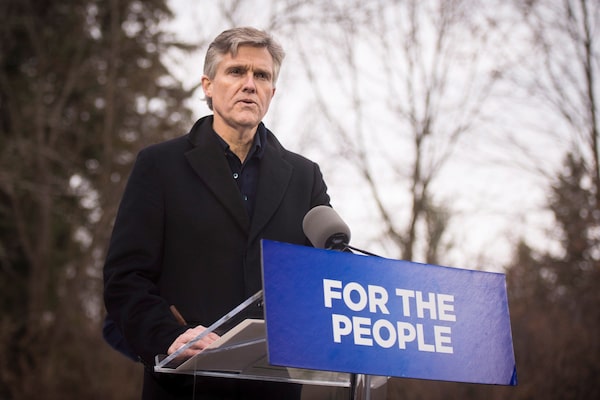Ontario’s Environment Minister Rod Phillips knows the references to flooded basements and litter pickup in the province’s new climate plan are not being taken seriously by some environmental experts.
But when it came to crafting the Ford government’s much-awaited response to Ottawa’s carbon-pricing plan, Mr. Phillips had a simple goal: make climate change relatable.
“Part of where the previous government and, frankly, the federal government, have lost the storyline, is in making the connections to impacts on people,” Mr. Phillips said in a recent interview over lunch in downtown Toronto.

Ontario Environment Minister Rod Phillips discusses the government's climate plan during a press conference at the Cold Creek Conservation Area in Nobleton, Ont., on Nov. 29, 2018.Tijana Martin/The Canadian Press
“Some of the – I’ll call them the environmental sophisticates – they actually mock that approach.”
Alongside the province’s scaled-back goals of regulating industrial greenhouse-gas emitters and $400-million in government funding to develop clean technology with the private sector, the climate-change plan announced last week also includes numerous references to algae, shoreline cleanups and an official day dedicated to picking up litter.
“Of course these things are not solely about climate change, but they relate to climate change. So the narrative of the previous government was, ‘Everything’s about climate change and there’s almost nothing we can do, and the world’s going to end,’” Mr. Phillips said. “That wasn’t, to my mind, being very effective in terms of engaging people.”
It’s a message the 53-year-old former businessman will bring to federal Environment Minister Catherine McKenna this week, when the two are set to meet in Toronto. The province is also challenging the federal carbon tax in court – arguing in a factum released last Friday that the federal Liberals are trying to impose a form of “unconstitutional disguised taxation."
Since the Ford government took office in June, Ontario and Ottawa have had a tense relationship when it comes to global warming. It’s an issue Mr. Phillips said the federal government is using to its political advantage, although Premier Doug Ford has not shied away from taking on Prime Minister Justin Trudeau.
“This has given [the federal government] something that they can argue vociferously against Doug Ford about. And I think that is useful right now for them,” Mr. Phillips said.
“I believe that Catherine McKenna believes that a carbon tax will be effective. I don’t think she’s just making it up. So the fact that we disagree about that is just two people disagreeing, looking at the same set of facts and coming to a different conclusion.”
Since its release last week, Ontario’s plan, which scales back the previous Liberal government’s climate-change goals, has been criticized as inadequate and too simplified to make a difference. “We need a climate plan, not a litter-reduction plan,” Ontario Green Party Leader Mike Schreiner said last week.
Mr. Phillips argues that Ontario has already done its share by reducing emissions by 22 per cent since 2005 – a result of coal-fired power-plant closings. And while the Ford government’s decision to end the provincial Liberals’ cap-and-trade system will make it more difficult for Canada to meet its Paris climate-accord commitments, Mr. Phillips appears to take great pleasure in pointing out that Ontario has adopted Ottawa’s greenhouse-gas targets.
“Just a carbon tax has never been proven to do what [the federal government] said it would do. It would have to be at a level that even they are not likely to really impose,” he said.
For her part, Ms. McKenna has said that the Ontario government is taking a step backward in Canada’s battle to reduce emissions.
“Any serious climate plan includes a price on pollution. When pollution is free, there will be more of it,” she said when the Ontario plan was released.
Mr. Phillips, the former CEO of the Ontario Lottery and Gaming Corporation and onetime chair of Postmedia, got his start in politics as a volunteer, before becoming chief of staff to former Toronto mayor Mel Lastman 20 years ago.
He decided to run in the 2018 election because he was “sincerely worried” about the future of the province if Kathleen Wynne’s Liberals were re-elected.
“We were all talking about affordability in the campaign, and her solution was redistribution. I don’t think that that works in the long run. As Margaret Thatcher said once, eventually you run out of other people’s money," he said.
Although different in tone than the Premier, Mr. Phillips calls Mr. Ford, whom he recently witnessed chatting on his cellphone with GM employees, “an incredible politician.” While critics have accused the Ford government of moving too quickly on its agenda without a cohesive plan, Mr. Phillips said the sense of elected officials getting things done “is what people want.”
“If people fundamentally disagree with what we’re doing, they’re going to have a different reaction," he said. "And it’s in their interest to make things look like there’s chaos.”
 Laura Stone
Laura Stone